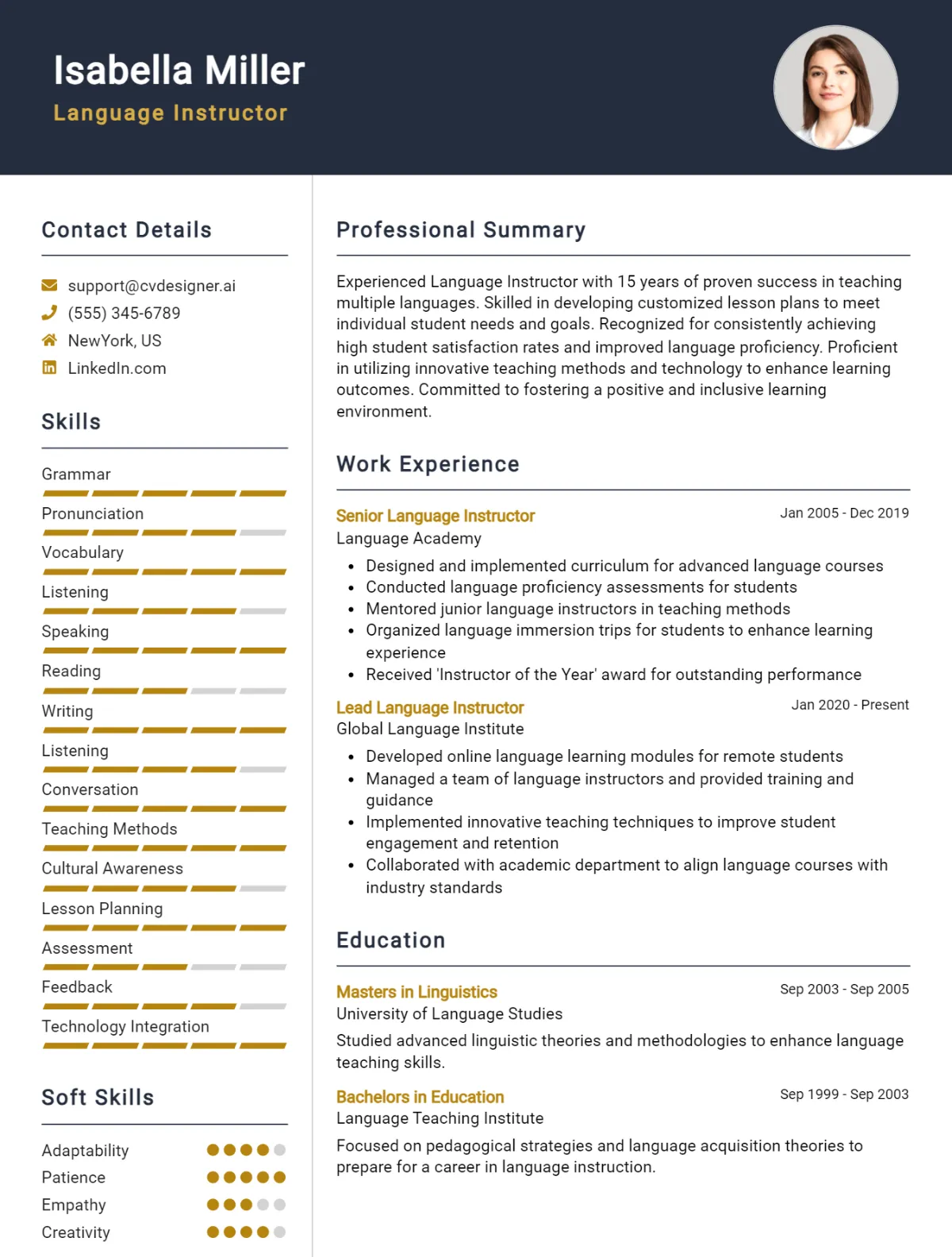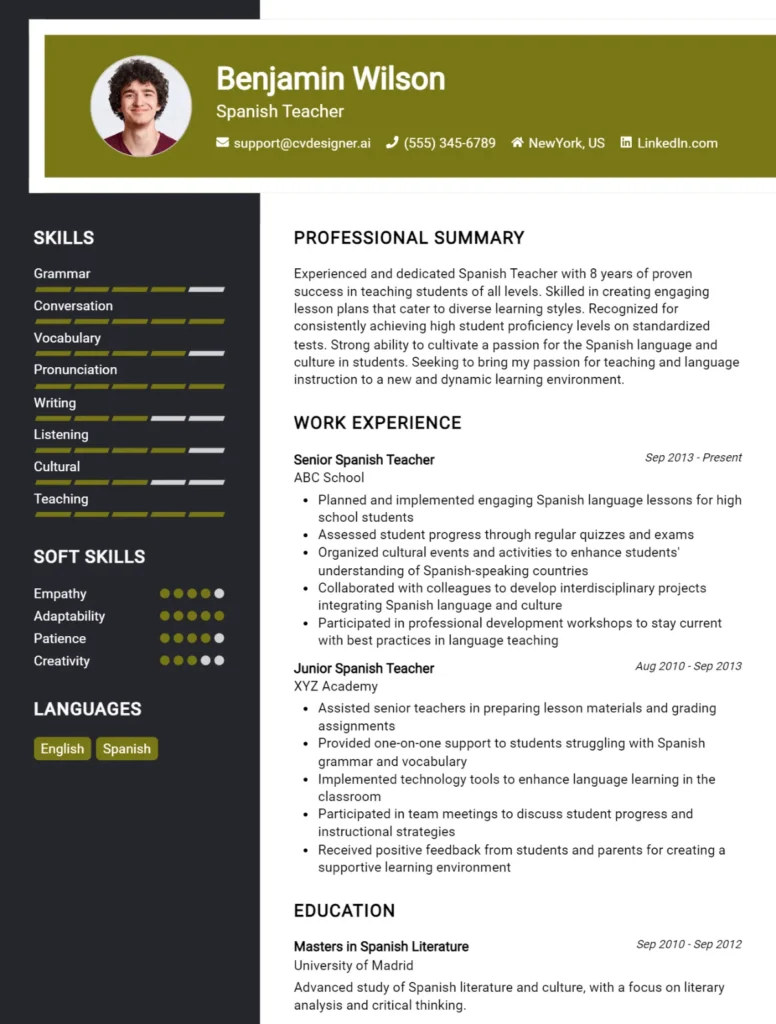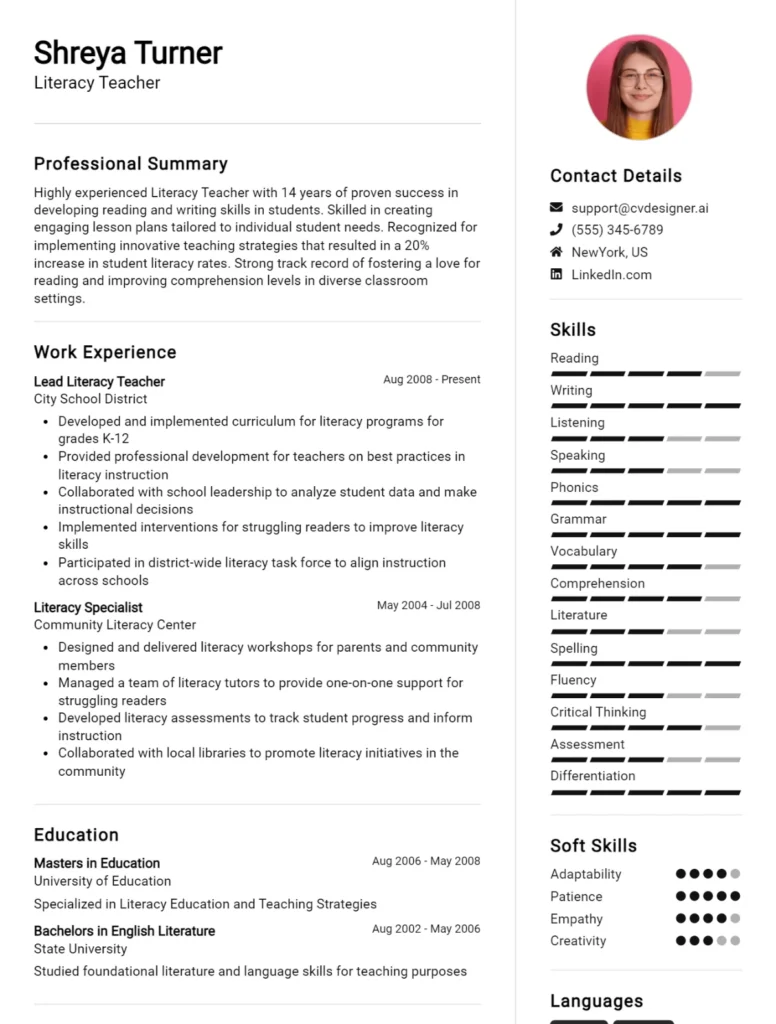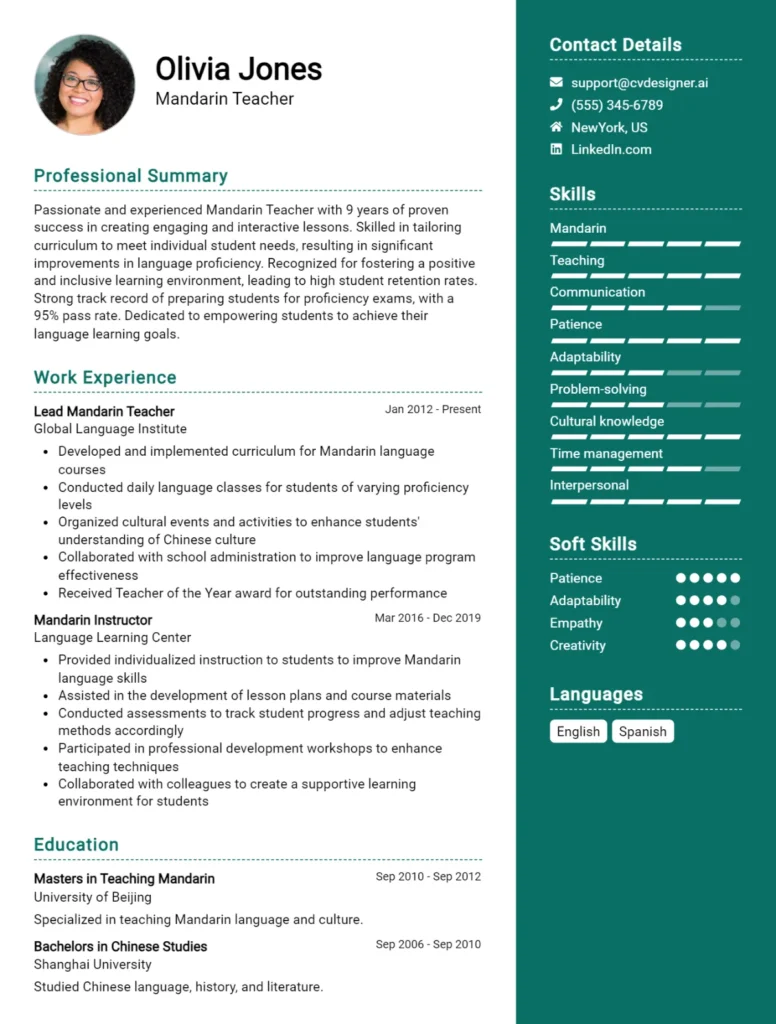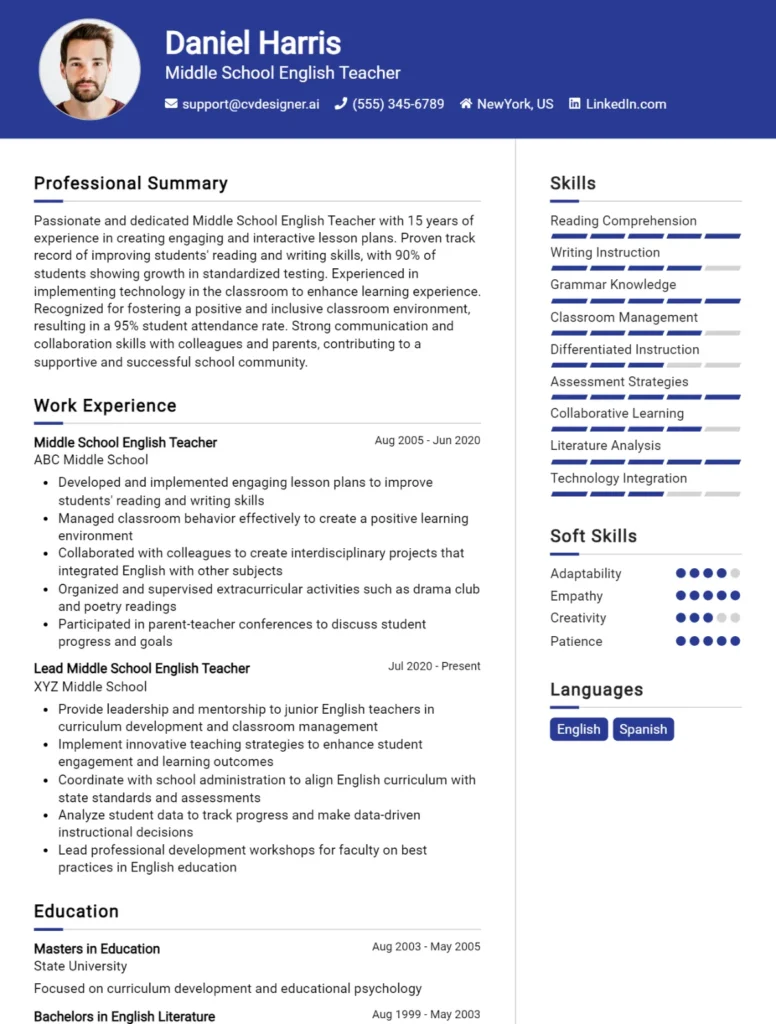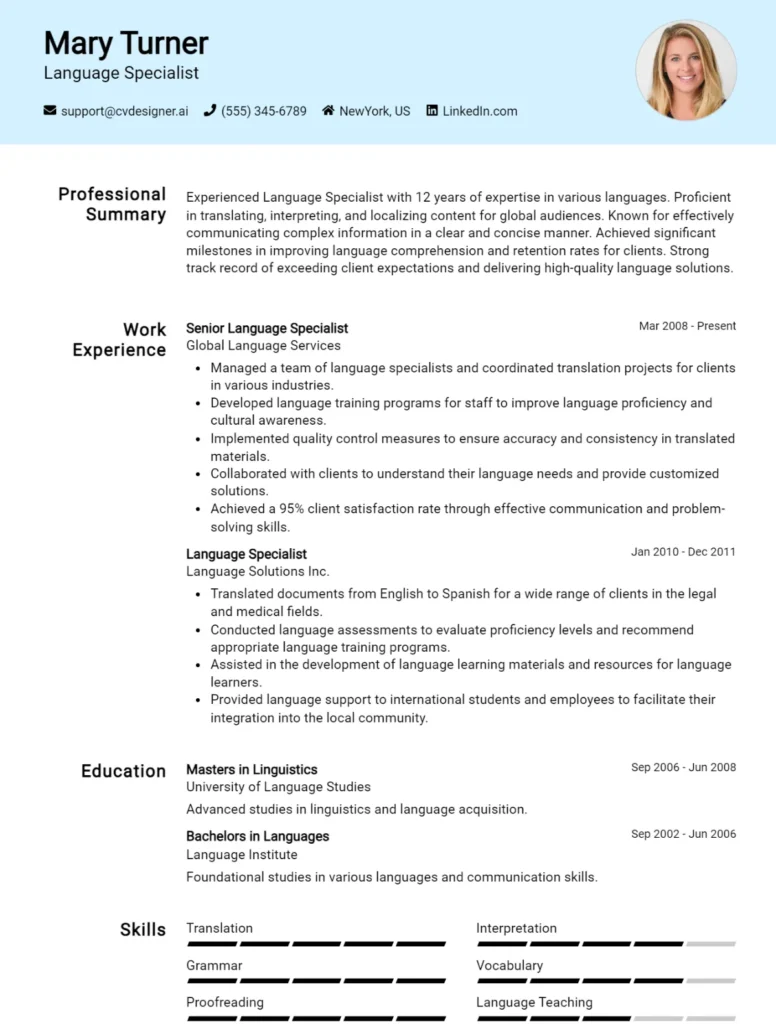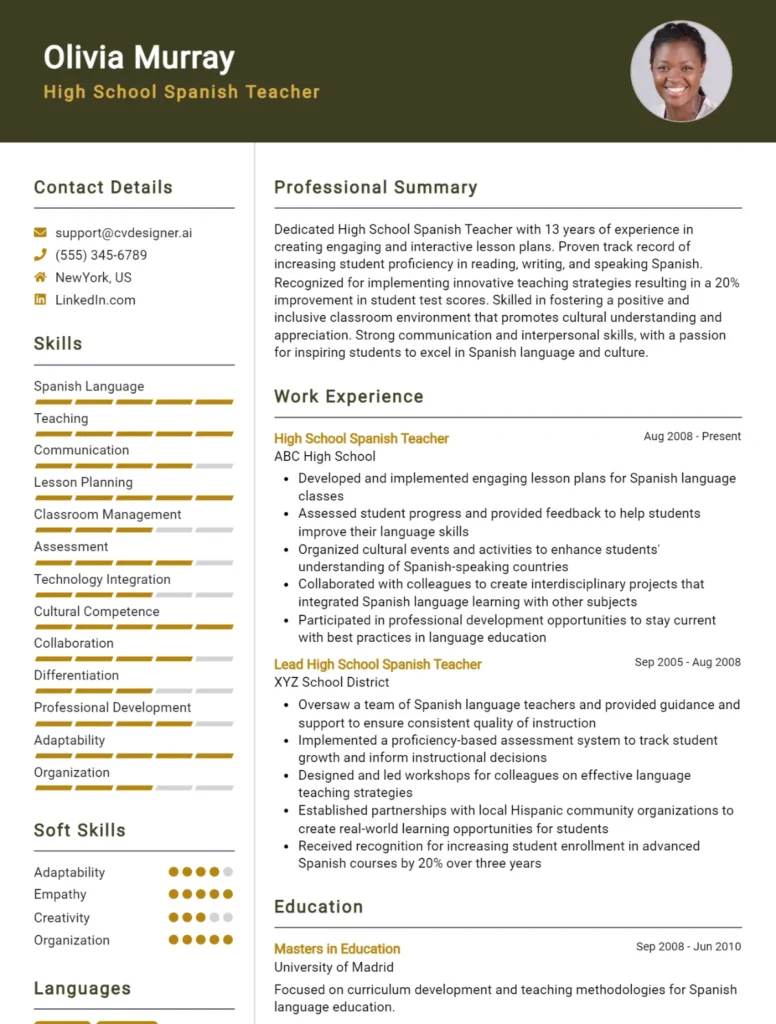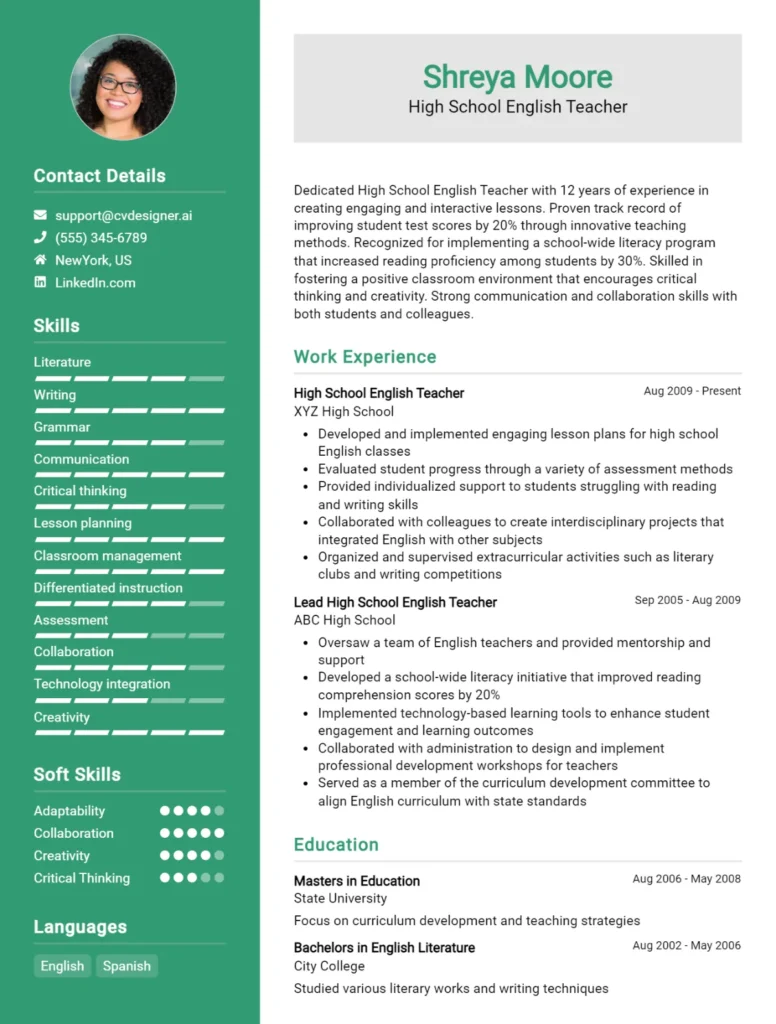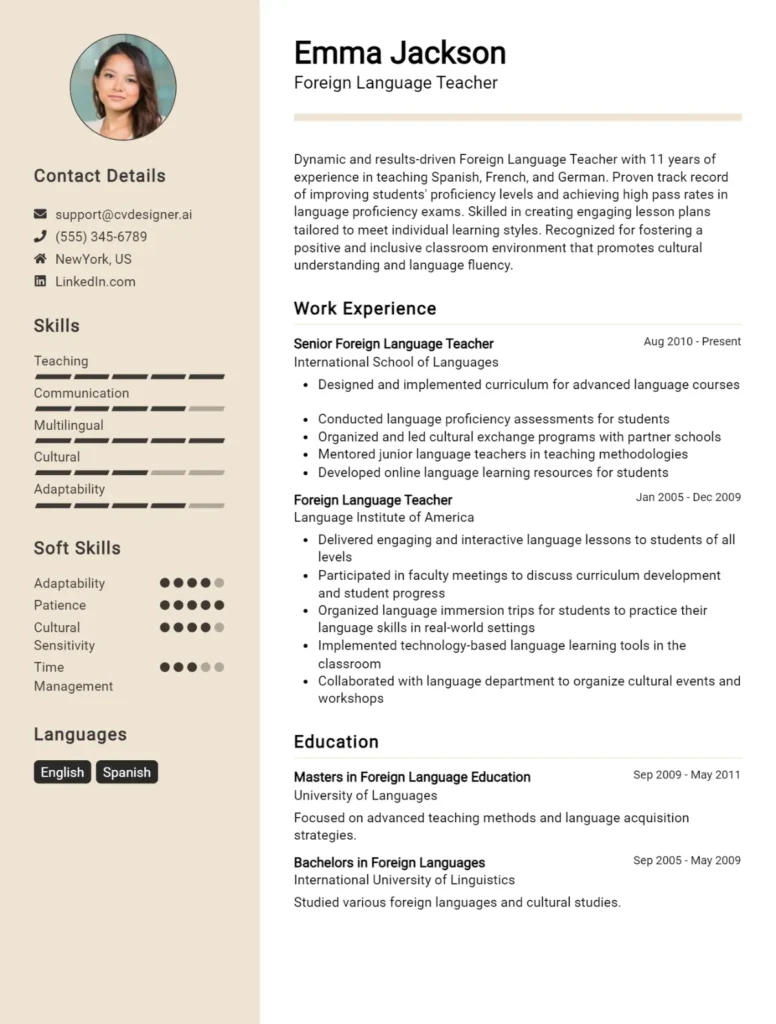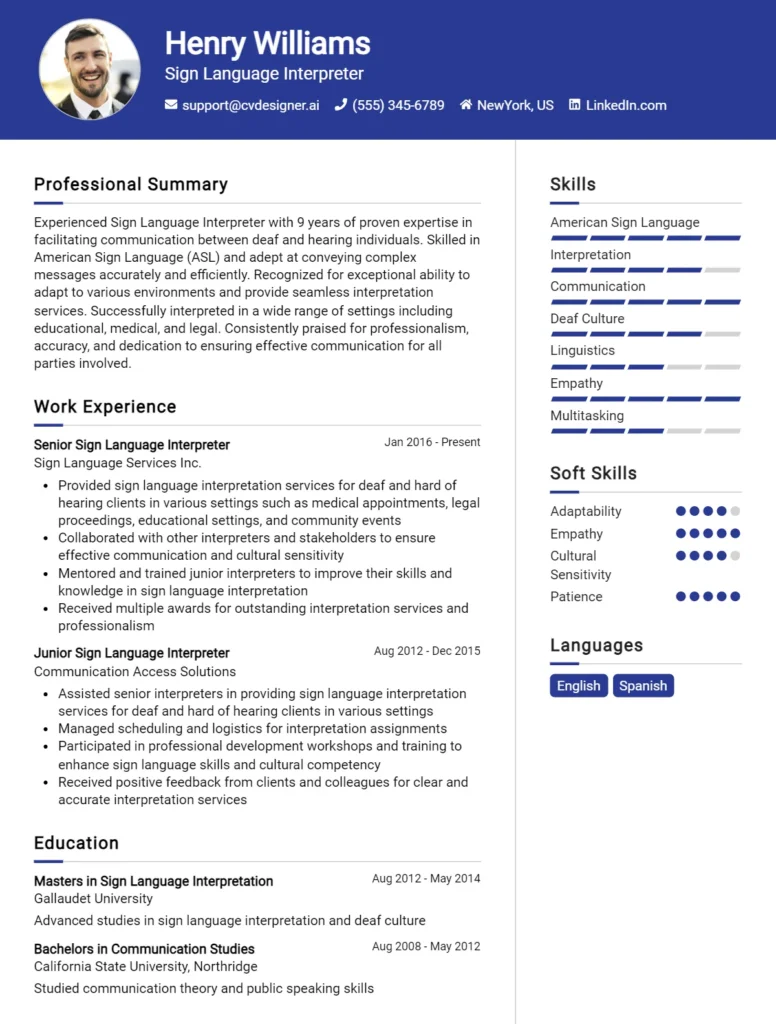Most Popular Language Instructor CV Examples
Explore additional Language Instructor CV samples and guides and see what works for your level of experience or role.
As a Language Instructor, creating a compelling CV is essential for showcasing your skills, experience, and passion for teaching. In this guide, we will provide you with valuable insights into crafting a standout CV that will capture the attention of potential employers. Whether you are an experienced educator or just starting your career, mastering the art of CV writing can set you apart in this competitive field. Here's what you can expect to learn:
- The key components of a Language Instructor CV, including essential sections to include
- Tips for highlighting your teaching experience and qualifications effectively
- Strategies for showcasing your language proficiency and pedagogical skills
- Guidance on tailoring your CV for specific job applications
- An example CV that illustrates the best practices discussed
Dive in to discover how to present your unique teaching background in a way that resonates with hiring managers and opens doors to exciting opportunities!
What is a Language Instructor CV?
A Language Instructor CV serves as a crucial marketing tool that outlines an educator's qualifications, experience, and teaching philosophy. It highlights relevant skills, such as proficiency in multiple languages, instructional strategies, and cultural competency, which are vital for effectively teaching diverse student populations. A well-crafted CV not only showcases the instructor's educational background and certifications but also provides insight into their teaching methodologies and experiences. To create an impactful CV, referencing a comprehensive cv writing guide can help instructors emphasize their strengths and tailor their documents to specific job opportunities.
The importance of a Language Instructor CV extends beyond securing a teaching position; it also reflects the instructor's professionalism and commitment to the field. A polished CV can open doors to various opportunities, including language schools, universities, and online teaching platforms. Additionally, utilizing a cv maker can streamline the process, allowing instructors to create visually appealing and well-organized documents that stand out to potential employers. In a competitive job market, a strong CV becomes not just a summary of qualifications, but a vital component in building a successful teaching career.
Key Components of a Language Instructor CV
- Contact Information: Include your full name, phone number, email address, and LinkedIn profile or personal website if applicable.
- Professional Summary: A brief overview of your qualifications, teaching philosophy, and specific language expertise that captures the attention of potential employers.
- Education: Detail your academic background, including degrees earned, institutions attended, and any relevant certifications in language education.
- Teaching Certifications: List any certifications specific to language instruction, such as TEFL, TESOL, or CELTA, which validate your teaching capabilities.
- Language Proficiency: Specify the languages you speak fluently, along with your proficiency levels, to demonstrate your qualifications as a language instructor.
- Skills: Highlight relevant skills that showcase your teaching style, classroom management, and adaptability to different learning environments.
- Work Experience: Provide a detailed account of your work experience, including previous teaching roles, responsibilities, and achievements in language instruction.
- Professional Development: Mention any workshops, seminars, or courses you have attended to further enhance your teaching skills and stay updated with educational trends.
- Teaching Methodologies: Describe the teaching methods and techniques you employ to engage students and facilitate effective language learning.
- Curriculum Development: Include any experience you have in designing or adapting curriculum materials to fit the needs of diverse learners.
- Student Assessments: Outline your experience with evaluating student progress, including methods of assessment and feedback you provide to learners.
- References: Offer professional references who can vouch for your teaching effectiveness and character, ideally including former supervisors or colleagues in the education field.
Sample Language Instructor CV for Inspiration
John Doe
123 Language Lane
Cityville, ST 12345
(123) 456-7890
john.doe@email.com
Professional Summary
Dedicated Language Instructor with over 8 years of experience teaching English as a Second Language (ESL) and Spanish to diverse groups of students. Adept at developing engaging lesson plans that cater to different learning styles and proficiency levels. Proven track record of improving student language skills and cultural understanding through interactive and immersive teaching methods. Committed to fostering a positive and inclusive classroom environment.
Work Experience
Senior Language Instructor
Cityville Language Academy, Cityville, ST
June 2018 – Present
- Designed and implemented comprehensive ESL and Spanish curriculum for adult learners, focusing on conversation skills, grammar, and cultural nuances.
- Conducted assessments to evaluate student progress and tailored instruction to meet individual needs, resulting in a 30% increase in student retention rates.
- Facilitated weekly language exchange workshops, promoting practical language use and cultural exchange among students from diverse backgrounds.
- Collaborated with fellow instructors to develop best practices and resource materials, enhancing the overall teaching quality of the academy.
Language Instructor
Global Language Center, Townsville, ST
August 2015 – May 2018
- Taught English and Spanish to children and adults, utilizing multimedia resources and interactive activities to enhance language acquisition.
- Developed assessment tools to measure student progress and provide constructive feedback to support their learning journey.
- Organized cultural events and language immersion activities, fostering a deeper appreciation for language and culture among students.
- Participated in professional development workshops to stay current with innovative teaching strategies and language instruction methodologies.
ESL Instructor
Community College of Townsville, Townsville, ST
January 2014 – July 2015
- Instructed ESL courses for non-native speakers, focusing on reading, writing, speaking, and listening skills.
- Created an inclusive learning environment by employing differentiated instruction techniques to accommodate varying proficiency levels.
- Collaborated with local organizations to provide language support to immigrants and refugees, helping them integrate into the community.
Education
Master of Arts in TESOL (Teaching English to Speakers of Other Languages)
State University, Cityville, ST
Graduated: May 2013
Bachelor of Arts in Spanish Language and Literature
State College, Townsville, ST
Graduated: May 2011
Skills
- Proficient in curriculum design and lesson planning
- Strong classroom management and communication skills
- Experience with language assessment tools and techniques
- Knowledge of various language teaching methodologies
- Proficient in educational technology and online teaching platforms
- Bilingual: English and Spanish
Publications
- Doe, J. (2021). "Engaging Language Learners: Innovative Strategies for the Modern Classroom." Journal of Language Teaching, 15(3), 45-60.
- Doe, J. (2020). "Cultural Competence in Language Education: Bridging Gaps Through Interactive Learning." International Journal of Language Studies, 12(2), 90-105.
Certifications
- TESOL Certification, International TESOL Association, 2013
- Advanced Spanish Language Proficiency Certification, Instituto Cervantes, 2012
- CPR and First Aid Certified, American Red Cross, 2021
Language Instructor CV Writing Tips
When crafting a CV as a Language Instructor, it's essential to highlight not only your language proficiency but also your teaching experience and methodologies. Tailor your CV to showcase your relevant qualifications, emphasizing your ability to engage diverse learners and adapt to different educational contexts. Use clear, concise language, and ensure that your layout is professional and easy to read. Include specific examples of your teaching accomplishments and any innovative approaches you've used to enhance language acquisition.
CV Writing Tips for Language Instructors:
- Highlight Language Proficiency: Clearly indicate your proficiency in the languages you teach, using the Common European Framework of Reference (CEFR) levels if applicable.
- Focus on Teaching Experience: Include detailed descriptions of your teaching roles, specifying the age groups and levels you have taught, as well as the duration of your experience.
- Showcase Educational Background: List relevant degrees and certifications, such as TESOL, TEFL, or language-specific qualifications, to establish your educational foundation.
- Emphasize Teaching Methodologies: Mention any particular teaching methods or approaches you have implemented, such as communicative language teaching or task-based learning.
- Include Professional Development: Highlight any workshops, seminars, or courses you have attended that relate to language instruction and pedagogy.
- Use Action Verbs: Start bullet points with strong action verbs (e.g., developed, implemented, assessed) to convey your achievements and responsibilities effectively.
- Tailor for Each Position: Customize your CV for each application, focusing on the skills and experiences that align most closely with the job description.
- Add a Personal Touch: Consider including a brief personal statement or teaching philosophy that reflects your passion for language instruction and your commitment to student success.
Language Instructor CV Summary Examples
As a Language Instructor, crafting a compelling CV summary is essential to showcase your skills, experience, and passion for teaching. Here are several examples that highlight various strengths and teaching philosophies for your consideration:
“Dedicated and passionate Language Instructor with over 5 years of experience in teaching English as a Second Language to diverse student populations. Skilled in creating engaging lesson plans that promote active learning and cultural understanding, fostering a positive classroom environment.”
“Dynamic Language Instructor with a proven track record of helping students achieve fluency in Spanish through innovative teaching methods and personalized tutoring. Committed to fostering a love for language and culture while adapting to various learning styles and needs.”
“Enthusiastic Language Instructor with expertise in teaching French to high school students. Known for utilizing technology and multimedia resources to enhance the learning experience, while also emphasizing the importance of conversational skills and real-world application.”
“Results-oriented Language Instructor with a strong background in teaching Mandarin Chinese to adults and professionals. Focused on practical language acquisition and intercultural communication, with a dedication to providing immersive learning experiences that prepare students for global interactions.”
“Experienced Language Instructor with a specialization in German language education for beginners and intermediate learners. Adept at implementing communicative language teaching techniques and fostering a supportive atmosphere that encourages student participation and confidence.”
Build a Strong Experience Section for Your Language Instructor CV
As a Language Instructor, showcasing your work experience effectively is crucial to highlight your teaching skills, methodologies, and impact on students. Below are examples of strong work experience descriptions that can enhance your CV and demonstrate your qualifications in this field.
- Developed and implemented engaging lesson plans for beginner to advanced language learners, resulting in an average student improvement of 30% in language proficiency tests over a semester.
- Conducted personalized assessments to evaluate student progress and tailored instructional methods to meet diverse learning needs, enhancing overall student engagement and retention rates.
- Organized and led immersive language workshops and cultural exchange programs that enriched students' linguistic skills and cultural understanding, fostering a more global perspective.
- Utilized technology and multimedia tools, including language learning apps and interactive online resources, to facilitate dynamic and effective language instruction for both in-person and remote learners.
- Collaborated with fellow instructors to design and deliver a comprehensive curriculum that integrated speaking, listening, reading, and writing skills, ensuring a holistic language learning experience.
- Provided one-on-one tutoring sessions for students seeking additional support, leading to significant improvements in their confidence and language abilities, as evidenced by increased classroom participation.
- Engaged in continuous professional development by attending language education conferences and workshops, applying new techniques and insights to enhance teaching practices and improve student outcomes.
- Developed and maintained a positive classroom environment that encouraged open communication and cultural exchange, resulting in a 90% student satisfaction rate in end-of-semester evaluations.
Language Instructor CV Education Examples
As a Language Instructor, having a strong educational background is essential to effectively teach and inspire students in their language learning journey. Here are some examples of relevant educational qualifications that can enhance a Language Instructor's expertise and credibility:
- Bachelor's Degree in Linguistics: A foundational understanding of language structure and function, providing insights into phonetics, syntax, and semantics that are crucial for teaching languages.
- Master's Degree in Education with a focus on Language Acquisition: This advanced degree equips instructors with strategies for teaching languages to diverse learners, emphasizing pedagogical theories and practices that promote effective language learning.
- TESOL/TEFL Certification: Specialized training in Teaching English to Speakers of Other Languages (TESOL) or Teaching English as a Foreign Language (TEFL), which prepares instructors to teach English in various contexts, both domestically and internationally.
- Bachelor's or Master's Degree in the Target Language: A degree in the language being taught (e.g., Spanish, Mandarin, French) ensures deep knowledge of the language and its cultural context, allowing for a more immersive teaching experience.
- Certificate in Language Teaching Methodology: A certification focusing on modern language teaching methods, equipping instructors with innovative techniques to engage students and enhance their language skills effectively.
Skills to Highlight in Your Language Instructor CV
As a Language Instructor, it is essential to showcase a blend of both soft and hard skills that reflect your ability to teach effectively and connect with students. These skills will not only enhance your teaching capabilities but also foster a positive learning environment. Below is a comprehensive list of skills that should be highlighted in your CV to demonstrate your qualifications and expertise in language instruction.
Soft Skills:
- Communication Skills
- Patience
- Empathy
- Adaptability
- Cultural Awareness
- Creativity
- Problem-Solving
- Team Collaboration
- Time Management
- Motivation and Encouragement
Hard Skills:
- Proficiency in Multiple Languages
- Knowledge of Language Acquisition Theories
- Curriculum Development
- Lesson Planning
- Assessment and Evaluation Techniques
- Use of Language Teaching Software and Tools
- Classroom Management
- Familiarity with Online Teaching Platforms
- Grammar and Linguistics Expertise
- Pronunciation and Phonetics Instruction
Language Instructor CV Format
As a Language Instructor, crafting an effective CV is crucial to showcase your skills and experiences to potential employers. The format you choose can significantly impact how your qualifications are perceived. Different job levels may require distinct approaches in presenting your information.
For entry-level positions, a functional or combination CV format is often best, highlighting relevant skills and educational background. For mid-level instructors, a chronological format that emphasizes professional experience and achievements works well. Senior or specialized instructors may benefit from a targeted CV format that focuses on specific competencies and contributions to the field.
- Use a clear and professional layout that enhances readability.
- Start with a compelling summary that highlights your language expertise and teaching philosophy.
- Include relevant teaching certifications and language proficiencies prominently.
- List your teaching experience in reverse chronological order, detailing responsibilities and achievements.
- Highlight any innovative teaching methods or curriculum development you've implemented.
- Incorporate any additional skills, such as proficiency in technology or experience with diverse learning environments.
For more detailed guidance on CV formats, check out this cv format.
Common Mistakes to Avoid in a Language Instructor CV
When applying for a position as a language instructor, it's essential to present a polished and professional CV that highlights your qualifications and experience effectively. Many candidates make common mistakes that can detract from their overall appeal to potential employers. Avoiding these pitfalls can significantly enhance your chances of landing an interview and ultimately securing the job. Here are some key mistakes to steer clear of when crafting your CV:
- Using a generic CV: Tailor your CV to the specific language instructor position, highlighting relevant skills and experiences.
- Neglecting to include language proficiency levels: Clearly state your proficiency in the languages you teach, using recognized frameworks like CEFR.
- Overloading with jargon: While it's important to demonstrate your expertise, avoid using excessive technical language that may confuse the reader.
- Ignoring teaching certifications: Always include relevant teaching certifications and qualifications that bolster your credentials.
- Listing irrelevant work experience: Focus on experiences that are directly related to language instruction, omitting unrelated job roles.
- Failing to showcase teaching methodologies: Highlight specific teaching methods or approaches you utilize, as this demonstrates your instructional effectiveness.
- Omitting professional development: Include any workshops, seminars, or continued education that reflects your commitment to improving as an educator.
- Using an unprofessional email address: Ensure your email address is professional; avoid using nicknames or unprofessional handles.
- Neglecting to proofread: Spelling and grammatical errors can undermine your credibility, so always proofread your CV before submission.
- Not including measurable achievements: Provide quantifiable outcomes or accomplishments from your teaching experience to illustrate your impact as an instructor.
Key Takeaways for a Language Instructor CV
- Contact Information: Clearly present your name, phone number, email address, and location at the top of your CV for easy accessibility.
- Professional Summary: Craft a concise summary highlighting your language teaching philosophy, years of experience, and the languages you specialize in.
- Teaching Experience: List your previous teaching positions with details on the institutions, roles, and duration, emphasizing your achievements and contributions.
- Educational Background: Include degrees, certifications, and relevant professional development courses that enhance your teaching qualifications.
- Skills Section: Highlight key skills such as curriculum development, classroom management, and proficiency in language assessment techniques.
- Language Proficiency: Specify the languages you are fluent in, along with your proficiency levels (e.g., native, fluent, conversational).
- Teaching Methods: Mention any specific teaching methodologies or technologies you utilize, such as immersive learning, online tools, or interactive techniques.
- Professional Development: Include relevant workshops, seminars, or additional training that showcases your commitment to continuous learning in language instruction.
- Achievements and Awards: Highlight any awards or recognition received for your teaching excellence or contributions to language education.
- References: Consider adding a statement that references are available upon request to indicate your professional network.
- Customization: Tailor your CV for each application by using specific keywords from the job description to increase your chances of being noticed.
- Visual Appeal: Utilize cv templates that are both professional and visually appealing to make a strong first impression.
- Cover Letter: Pair your CV with a compelling cover letter using cover letter templates to further express your passion for teaching and your qualifications.
- Online Portfolio: If applicable, include a link to your online portfolio or website showcasing your teaching materials, resources, and testimonials from students or peers.
- CV Builder: Consider using a cv builder for easy formatting and layout options to create a polished and professional CV.
Build your CV in minutes
Use an AI-powered cv builder and have your cv done in 5 minutes. Just select your template and our software will guide you through the process.
